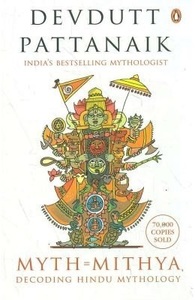You need to sign in or sign up before continuing.
Take a photo of a barcode or cover
Brought up in an ultra religious polytheist Hindu family (though I often find my own beliefs toggling between Deism and Agnosticism) I thought I knew all there is about Hinduism and it's many stories and fables. But I took them always as stories and fables and never tried to go deeper into the concepts or anthropology/ evolution of these stories.
We need to understand that Hinduism, or rather any religion today is an amalgamation of different myths and stories - which has become a part of our culture and beliefs today. No one knows the origin of these stories and you will often find differences within the same country while narrating the same story about the same god.
This book by Pattanaik explores the deeper meaning and context behind the concepts and Gods/ gods of Hinduism while tying them together under the umbrella of Hindu trinity. It explores the origin of many beliefs, relationship between culture and nature, and puts them in multiple metaphysical frameworks and charts
It is an easy short read yet which stimulates you through-out, some of the ideas are extremely bold for a stringent/ inflexible culture - which can very well be seen in multiple other reviews of this book.
The negatives - Some interpretations seems overdone, there is lot of jumping between many stoties and the title/ concept core of the book gets lost in between.
We need to understand that Hinduism, or rather any religion today is an amalgamation of different myths and stories - which has become a part of our culture and beliefs today. No one knows the origin of these stories and you will often find differences within the same country while narrating the same story about the same god.
This book by Pattanaik explores the deeper meaning and context behind the concepts and Gods/ gods of Hinduism while tying them together under the umbrella of Hindu trinity. It explores the origin of many beliefs, relationship between culture and nature, and puts them in multiple metaphysical frameworks and charts
It is an easy short read yet which stimulates you through-out, some of the ideas are extremely bold for a stringent/ inflexible culture - which can very well be seen in multiple other reviews of this book.
The negatives - Some interpretations seems overdone, there is lot of jumping between many stoties and the title/ concept core of the book gets lost in between.
informative
mysterious
fast-paced
challenging
informative
reflective
fast-paced
Gives an overview of Indian mythology and Gods and why there are so many of them. It is interesting to note that multiple notions of how understanding of life can be achieved is accommodated through various Gods and belief systems. I got to understand why Indians are obsessed about marriage and children, vrata, etc. While the author refers to stories to reaffirm the ideas, I am not sure if this is just the author's interpretation or if there are specific texts that explain the symbols and colours, etc. Nevertheless a good read.
Read my review of the book here:
http://loadstoread.wordpress.com/2015/01/01/myth-mithya-a-handbook-of-hindu-mythology-by-devdutt-pattanaik/
http://loadstoread.wordpress.com/2015/01/01/myth-mithya-a-handbook-of-hindu-mythology-by-devdutt-pattanaik/
adventurous
challenging
hopeful
informative
reflective
fast-paced
For some strange reasons, I guess philosophy helps me now.
Our ancestors were geniuses; I mean even if it were all stories and mythology, there is this fact that can 1 person actually think that all by himself and jot it down. Maybe that's an elite club of super dudes (read storytellers), how? plain, simple how can people of long, long ago be so insightful?!? You see, genius spotted.
And what a piece of unattenuated thoughts. Pure and simple translation of thoughts. I wish it were longer and I could read it forever...
Our ancestors were geniuses; I mean even if it were all stories and mythology, there is this fact that can 1 person actually think that all by himself and jot it down. Maybe that's an elite club of super dudes (read storytellers), how? plain, simple how can people of long, long ago be so insightful?!? You see, genius spotted.
And what a piece of unattenuated thoughts. Pure and simple translation of thoughts. I wish it were longer and I could read it forever...
A delightful read for anyone interested in indian mythology. The structure, the content and the style are so good that I am looking for other books by the same author.
For a detailed review click on the link or paste the link below:
http://onerightword.blogspot.co.uk/2015/07/mythmithya-hindu-mythology-decoded-by.html
For a detailed review click on the link or paste the link below:
http://onerightword.blogspot.co.uk/2015/07/mythmithya-hindu-mythology-decoded-by.html
Myth=Mithya is about the myths/stories about the Gods and Goddesses that Hindus worship, while also highlighting the metaphysical aspects of possibly the oldest religion on earth. These stories are interesting, but as long as they are just stories, they are palatable. As per these tales, Gods and Goddesses used to behave much like humans and some of their actions were questionable to say the least (Brahma's pursuit of his daughter out of lust/desire made me very uncomfortable, so did the constant resort to 'cursing' whenever someone was offended by the smallest of reasons). I also don't understand how sages achieve enlightenment when they are always full of ego and rage, even while meditating (shouldn't meditation make you feel peaceful and less vindictive?). My idea of God, as a superior being, is an entity who is above human emotions or atleast embodies the best of the human attributes. Thus, it's hard for me, personally, to devote myself to flawed characters.
The stories make for an entertaining read though. And Devdutt Pattanaik's writing is engaging and simplistic.
The stories make for an entertaining read though. And Devdutt Pattanaik's writing is engaging and simplistic.
informative
reflective
medium-paced

